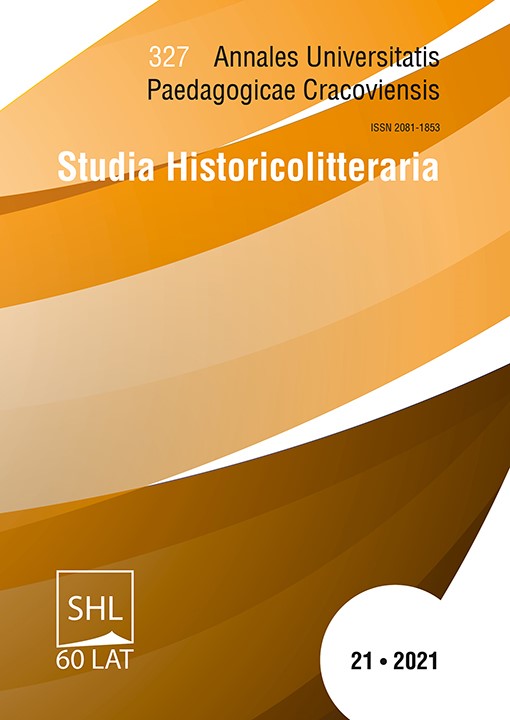Romantyzm krańców Europy. Portugalia, Polska i Chrystus narodów
Main Article Content
Abstrakt
This article tentatively provides acomparative outlook on Polish and Portuguese Romanticism. Taking as a starting point the famous parallel between the opposite ends of Europe sketched by the 19th-century historian Joachim Lelewel, the author claims that Polish and Portuguese literature, although they had almost no direct contact with each other, participated in the same system of cultural coordinates established by European Romanticism. At the same time, both nations had some sort of dispute or clash with Europe, developing syndromes of inferiority, as well as megalomaniac visions of their moral superiority. Almeida Garrett and Alexandre Herculano tried to provide a solution, harmonising their country with its European context. The conclusion accentuates the uttermost victory of this harmonising vision, presenting the contemporary Portuguese culture as fully Europeanised and contrasting it with the doubts concerning European identity that may be observed in contemporary Poland.
Downloads
Article Details

Utwór dostępny jest na licencji Creative Commons Uznanie autorstwa – Użycie niekomercyjne – Bez utworów zależnych 4.0 Międzynarodowe.
POLITYKA PRAW AUTORSKICH
Wydawca „Annales Universitatis Paedagogicae Cracoviensis. Studia Historicolitteraria” jest upoważniony do korzystania oraz do rozpowszechniana wszystkich opublikowanych w czasopiśmie materiałów na podstawie umowy licencji niewyłącznej, zawartej uprzednio na czas nieoznaczony każdorazowo z autorem/ką konkretnego utworu na określonych w tamtejszej umowie polach eksploatacji.
POLITYKA OTWARTEGO DOSTĘPU
„Annales Universitatis Paedagogicae Cracoviensis. Studia Historicolitteraria” to czasopismo o otwartym dostępie, a cała jego zawartość jest dostępna bezpłatnie dla użytkowników i instytucji na zasadach licencji niewyłącznej CreativeCommons (CC BY-NC-ND 4.0). Użytkownicy/ki mogą czytać, pobierać, wykonywać kopie, rozpowszechniać, drukować, wyszukiwać lub linkować do pełnych tekstów artykułów w tym czasopiśmie bez uprzedniej zgody wydawcy lub autora/ki pod warunkiem podania źródła dostępu i autorstwa danej publikacji. Jest to zgodne z definicją otwartego dostępu BOAI (http://www.soros.org/openaccess).
Bibliografia
Anderson B., Wspólnoty wyobrażone. Rozważania o źródłach i rozprzestrzenianiu się nacjonalizmu, przeł. S. Amsterdamski, Kraków - Warszawa 1997.
Damrosch D., What Is World Literature?, Princeton – Oxford 2003.
Garrett A., Camões. Poema, Paris 1825.
Garrett A., D. Branca ou a conquista do Algarve, Paris 1826.
Garrett A., O Romanceiro, wyd. 5, t. 1, Lisboa 1875.
Garrett A., Theatro de J. B. de Almeida-Garrett, Lisboa 1844.
Garrett A., Viagens na minha terra, Lisboa 1846.
Herculano A., Eu e o clero. Carta ao Em.mo Cardeal-Patriarca, Lisboa 1850.
Herculano A., A harpa do crente. Tentativas poéticas, Lisboa 1838.
Herculano A., Monasticon. Eurico, o presbítero; O Monge de Cister, Lisboa 1847.
Lelewel J., Historyczna paralela Hiszpanii z Polską w XVI, XVII, XVIII wieku, oprac. J. Kieniewicz, Warszawa 2006.
Lourenço E., O labirinto de saudade. Psicanálise mítica do destino português, Lisboa 1978.
Lourenço E., Portugal como destino seguido de Mitologia da Saudade, Lisboa 1999.
Łukaszyk E., Mgławica Pessoa. Historia literatury portugalskiej od romantyzmu do współczesności, Wrocław 2019.
Łukaszyk E., Raczyński w Portugalii. Spuścizna „zderzenia kultur”, „Postscriptum Polonistyczne” 2018, nr 1(21), s. 27–43.
Mickiewicz A., Księgi narodu polskiego i pielgrzymstwa polskiego, Paris 1832.
Quental A. de, Prosas sócio-políticas, oprac. J. Serrão, Lisboa 1982.
Saramago J., Kamienna tratwa, przeł. W. Charchalis, Poznań 2011.
Saramago J., Levantado do Chão, Lisboa 1980.
Sowa J., Fantomowe ciało króla. Peryferyjne zmagania z nowoczesną formą, Kraków 2011.
Tazbir J., W pogoni za Europą, Warszawa 1998.
Vidal L., Mazagan. Miasto, które przepłynęło Atlantyk z Maroka do Amazonii (1769–1783), przeł. M. Berger, Warszawa 2008.
